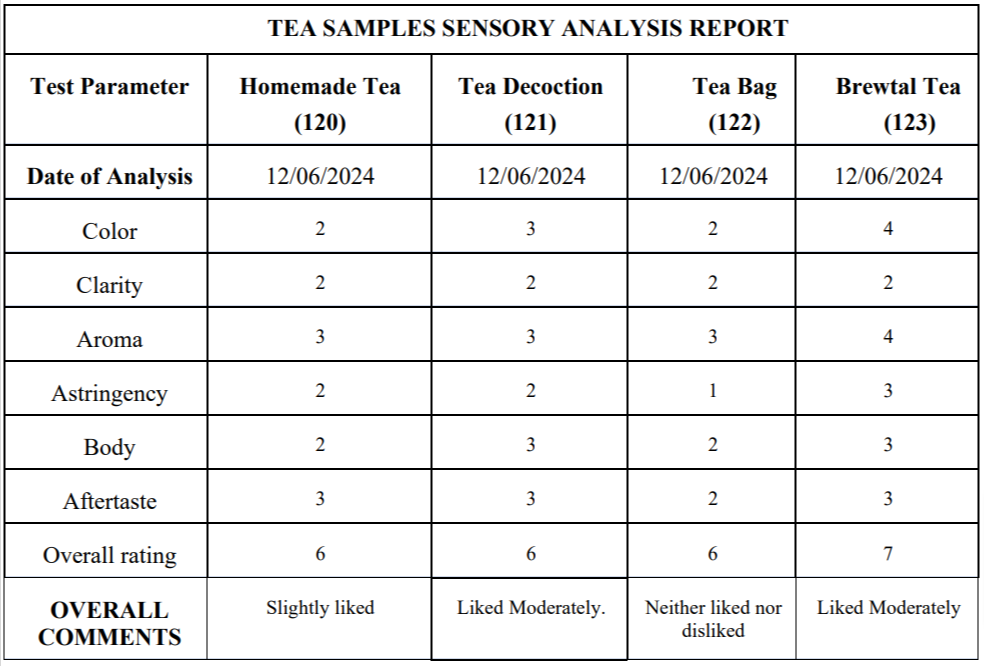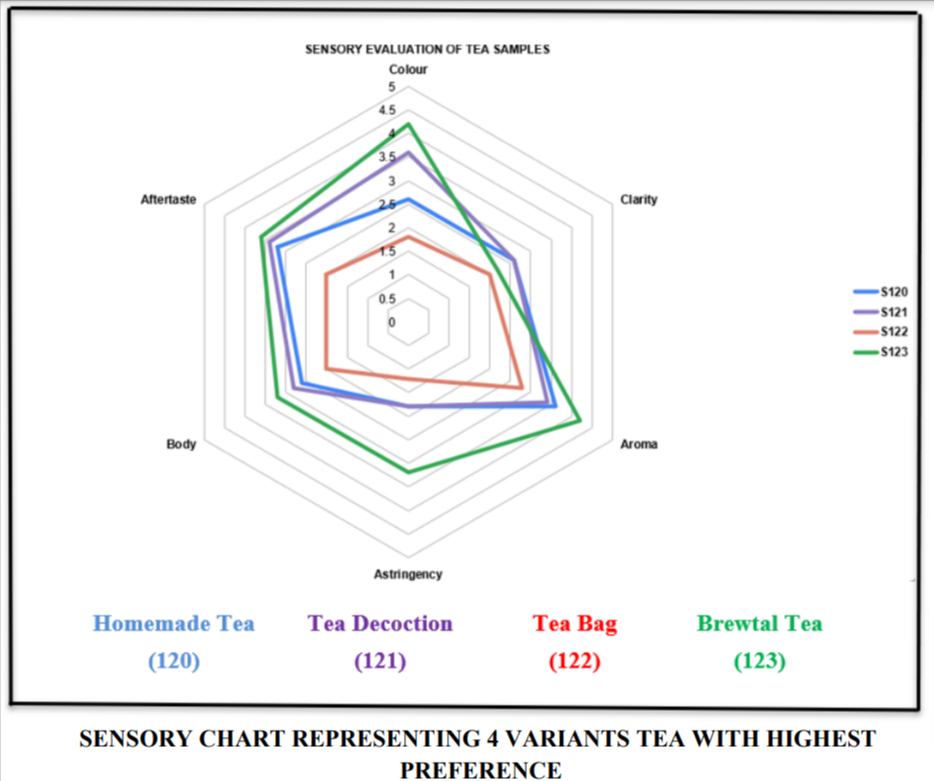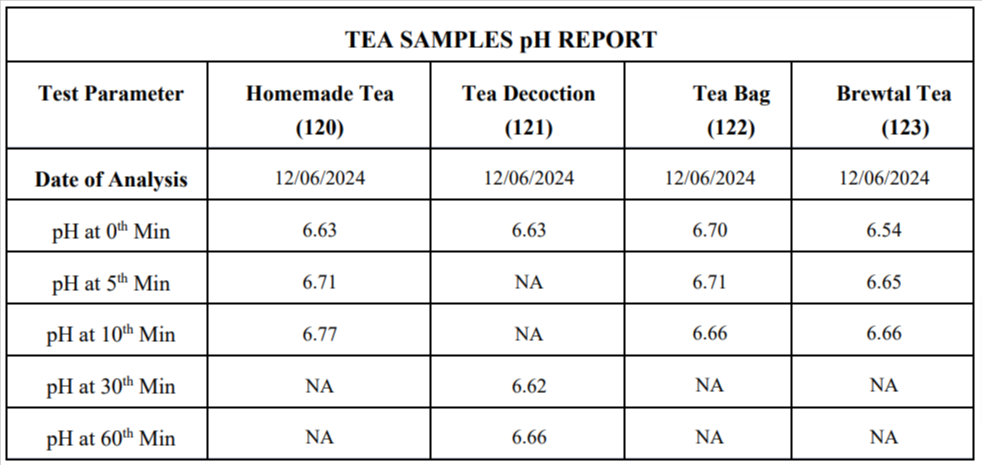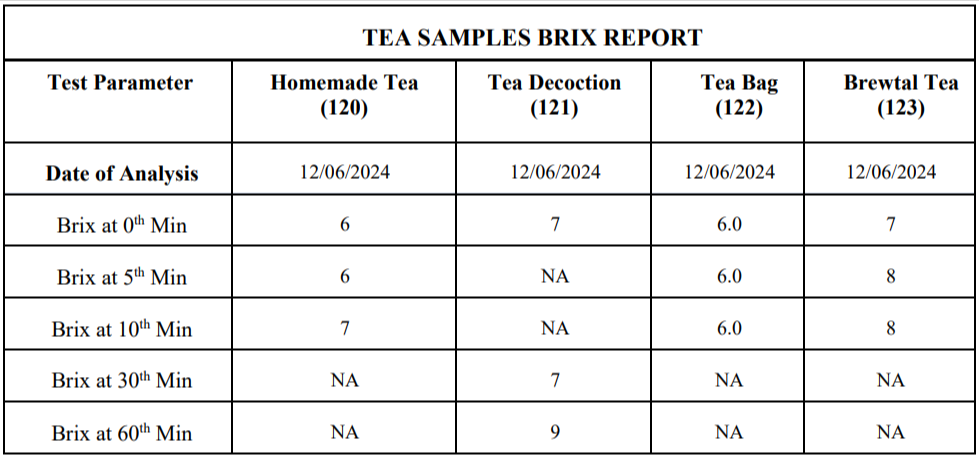
20 Jul Brewtal Tea Clinically Proven as The Best Office Tea by FSW
At Brewtal, we believe that our tea is superior to any other office tea and as authentic as home-style Indian chai. We take pride in the quality, flavour, and authenticity of our brews. This is courtesy of our supremely inventive TrueBrew Tech, which boils real tea leaves with milk, water, and spices, just like you would at home. All of this, in just 30 seconds. Office goers get freshly brewed, kadak chai, on-demand. Without having to order in or leaving their offices.
But claims of our superiority are just that—claims. That’s why we partnered with Food Safety Works, a trusted name in food safety, to put Brewtal to the test against other office tea machines.
Analysis for 4 Tea Samples was carried on the basis of – pH, Brix & Sensory Analysis.
The 4 tea samples included – Homemade Tea, Tea Decoction, Tea Bag and Brewtal Tea.
The analysis of pH and Brix in tea is critical for understanding its quality, taste, and overall chemical composition. pH indicates the acidity or alkalinity of tea, while Brix measures the sugar content & Total dissolved solids, which influences the physical properties of tea.

pH in Tea analysis
pH is a crucial factor in tea that affects its taste, shelf life, and biochemical stability. Most teas have a pH range between 4.5 and 7.
Lower pH (more acidic) in tea can enhance certain flavors and is preferred in some cultures and for specific health benefits, such as aiding digestion. However, extremely low pH can cause dental erosion and gastrointestinal discomfort.
Brix in Tea analysis
Brix is a measure of the sugar content in a liquid, expressed as the percentage of sucrose by weight. In tea, Brix levels can indicate sweetness, total dissolved solids and overall flavor intensity, crucial for consumer satisfaction and product formulation.
Brix is typically measured using a refractometer, which assesses the degree to which light is bent (refracted) by the tea sample. The Brix level in tea can be influenced by the type of tea, brewing time, and temperature, as well as the addition of sweeteners. For instance, longer brewing times and higher temperatures can extract more soluble solids, increasing the Brix value.
The analysis of pH and Brix in tea provides essential insights into its chemical properties, taste, and quality. pH levels affect the acidity and potential health benefits of tea, while Brix levels influence sweetness, total dissolved solids & flavor intensity.
Sensory analysis for Tea
Sensory analysis of tea samples is a comprehensive evaluation of tea’s attributes using human senses. This process involves assessing the appearance, aroma, flavor, mouthfeel, and overall quality of the tea.
Components of tea sensory includes.
a) Color.
b) Appearance.
c) Aroma.
d) Flavor.
e) Mouthfeel.
f) Aftertaste.
g) Overall acceptability.
Mainly Sensory analysis for tea was carried in 2 scales test such as 5-point scale and 9-point scale. A 5-point scale is straightforward and efficient for quick assessments. It involves rating each attribute from 1 to 5, with 1 being the lowest and 5 being the highest.
The Results Speak for Themselves
Here’s what the tests revealed:




Analysis Summary
The overall analysis of tea samples for 4 variants tested are interpreted as follows:
pH
Among 4 samples Brewtal tea had less acidic pH compared with rest 3 samples this
indicates the tea flavor is retained same without any change in aroma, freshness & strength contributing best preferred tea among other teas and process.
Brix
Among 4 samples Brewtal tea had good solubility of total solids promoting the overall acceptance through better mouthfeel and flavor as higher the total solids present play key role to enhance the product quality by giving better homogeneity to the sample and retains the freshness and strength of the tea for longer period as claimed upto 10 mins of initial brew time.
Sensory
Sensory analysis for 4 samples were carried by trained sensory panelist, majority of panelist considered Brewtal tea as best preferred due to its aroma, flavor, naturality as similar to homemade tea and the body of the tea has good freshness holding which makes panelist consider best among others even after 3 intervals of time difference Brewtal tea is considered to be best preferred due to its brewing process and quality of tea served from Brewtal.
1. Homemade tea – Homemade tea had a change over a period of time the pH increased leading towards alkalinity of the product and Brix gradually increased due to higher coagulation of tea which was not acceptable due to change in taste and quality.
2. Tea decoction – Tea decoction retained pH over longer period of time up to 60 mins, only change in Brix changed the quality of tea due to higher antioxidant activity of natural antioxidants causing higher coagulation of total solids.
3. Tea bag – The pH of tea bag seems to be high leading towards alkalinity causing not acceptable in terms of taste and quality due to less total solubility of the sample.
4. Brewtal tea – The pH retained same since all 3 intervals of analysis leading to better freshness and strength along with the brix had higher soluble content in the samples giving better texture and more acceptability among other 3 samples, this was best preferred.
So there you have it. Tea made by Brewtal Tea Maker is clinically proven to be the best office tea. So, if you’re still drinking terrible-tasting tea at the office, ask your Facility or Admin Manager to set up a demo with us ASAP.


